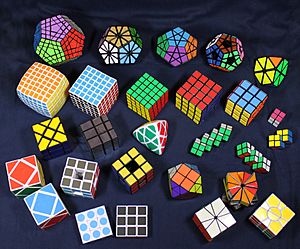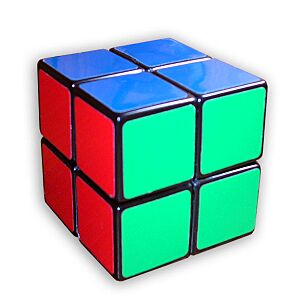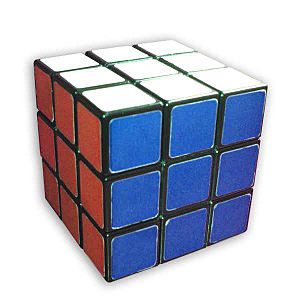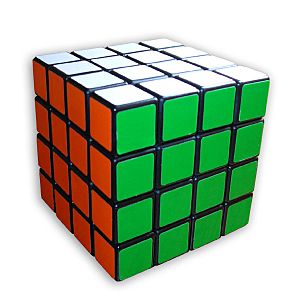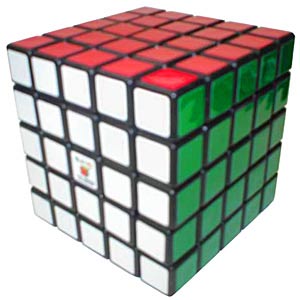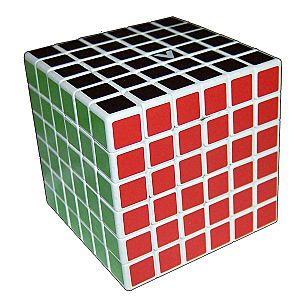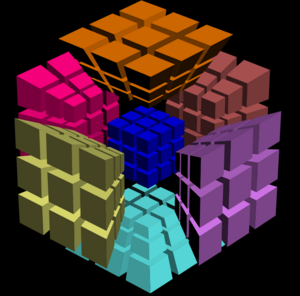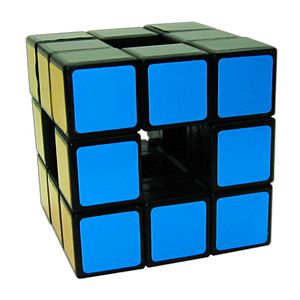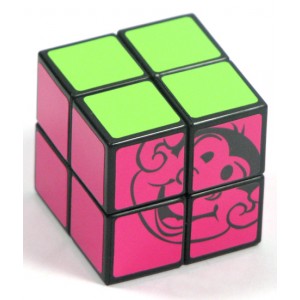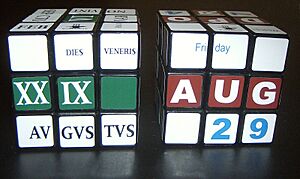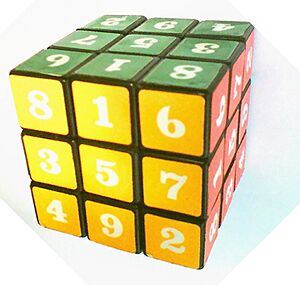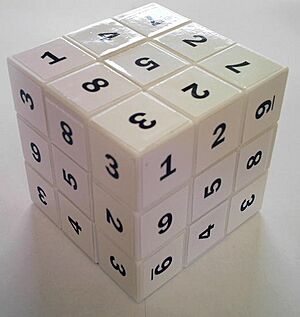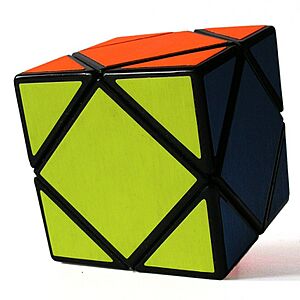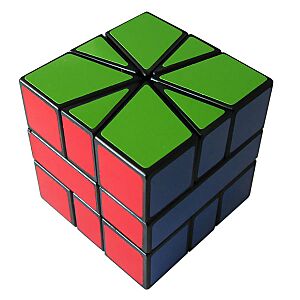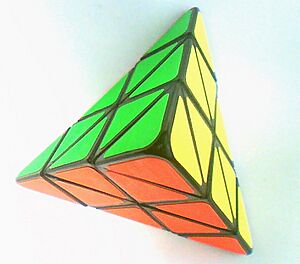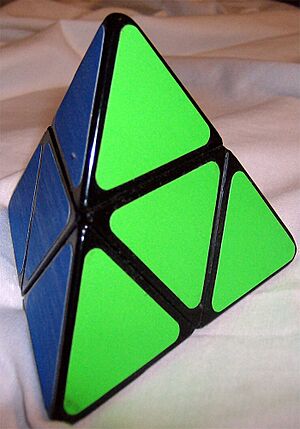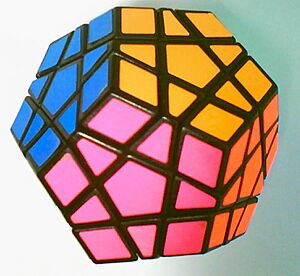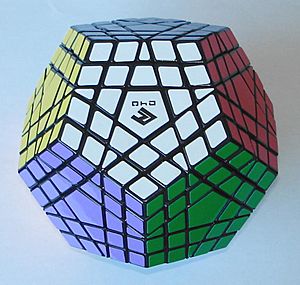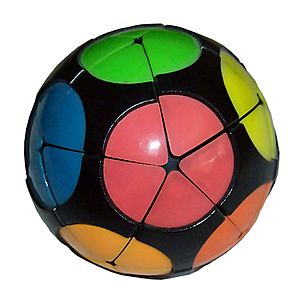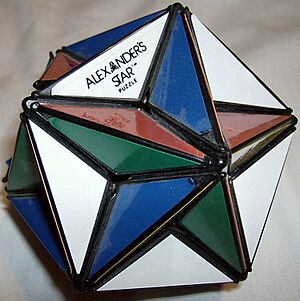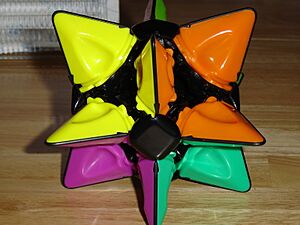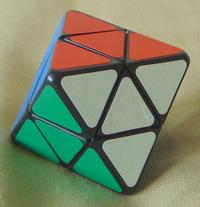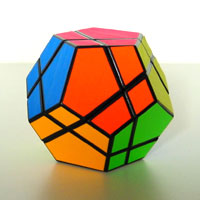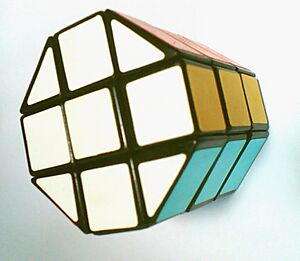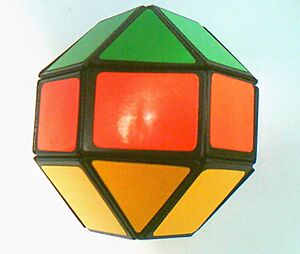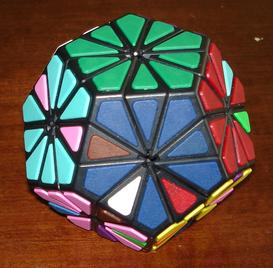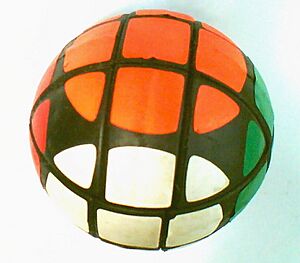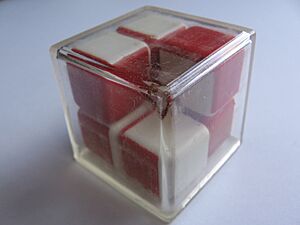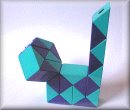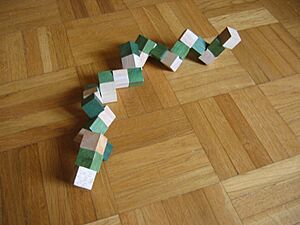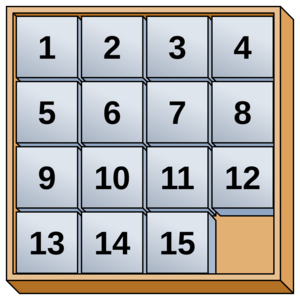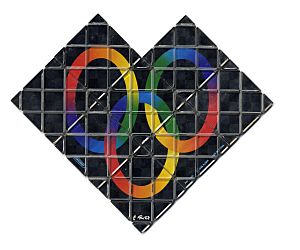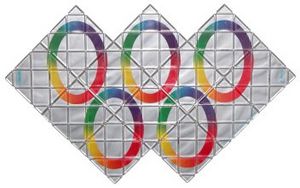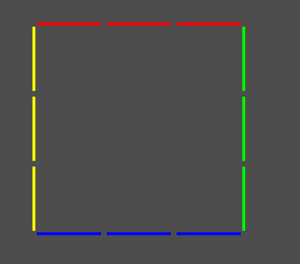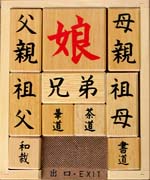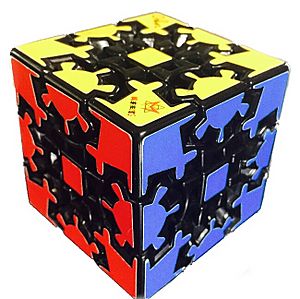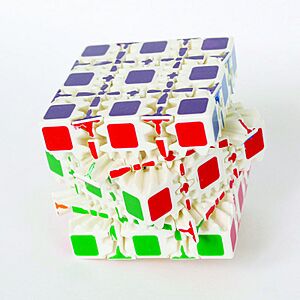Combination puzzle facts for kids
A combination puzzle is a type of puzzle with pieces that can be moved into different arrangements. You solve these puzzles by changing the pieces from a mixed-up (scrambled) state to a specific, organized pattern. This pattern might be "all colors together" or "all numbers in order."
Contents
What Are Combination Puzzles?
The most famous combination puzzle is the original Rubik's Cube. This cube has six faces, and each face can be turned. When solved, each face is a different solid color. But when it's mixed up, the colors are spread all over the cube. Puzzles like the Rubik's Cube, which you solve by rotating parts, are often called twisty puzzles. They usually involve turning faces, but some turn corners or edges.
The way a puzzle is built decides how its pieces can move. This means only certain combinations are possible. For example, on a Rubik's Cube, you can't just peel off the stickers and put them back. You have to use the allowed turns. This limits the ways you can solve the puzzle.
You don't always need a real, physical puzzle. Some combination puzzles exist only in virtual space, like on a computer. An example is the 4-dimensional 3×3×3×3 tesseract puzzle, which you can play with using special software.
Different Kinds of Combination Puzzles
Many different shapes of Rubik's-style puzzles have been made. Besides cubes, there are puzzles shaped like other geometric figures, such as polyhedra.
Cube-Shaped Puzzles
A cuboid is a box-shaped object where all its edges meet at right angles. In puzzles, "regular cuboids" mean all the pieces are the same size. These pieces are often called "cubies."
| Picture | Data | What makes it special |
|---|---|---|
|
Commercial name: Pocket Cube |
This puzzle is simpler than the standard Rubik's Cube because you only need to learn how to solve the corner pieces. It's still a fun challenge! | |
|
Commercial name: Rubik's Cube |
This is the original and most famous Rubik's Cube. | |
|
Commercial name: Rubik's Revenge |
Solving this is similar to the 3×3×3 cube. You need a few extra steps to fix the center pieces and edges. | |
|
Commercial name: Professor's Cube |
Like the 4x4x4, this one needs extra steps for the center pieces and edges compared to the 3x3x3. | |
|
Commercial name: V-CUBE |
The inventor, Panagiotis Verdes, has a special way to make cubes up to 11×11×11. He has working puzzles from 2×2×2 to 9×9×9. | |
|
4-Dimensional puzzle |
This puzzle is a 4-dimensional version of a cube, so you can't build it in real life. But you can play it on a computer! It's much harder than a regular cube. | |
|
Commercial name: Void cube |
This cube is like a regular 3x3x3, but it has no center pieces. It uses a special design because there's no middle core. | |
| Commercial name: Over The Top Shape: Cube |
This is a very large cube, first made using 3D printing. It's now mass-produced by a Chinese company. |
Puzzles with Different Patterns
Many puzzles look like regular cubes but have different patterns or colors. Some are made for special events. The puzzles below are interesting because their patterns change how hard they are to solve.
| Picture | Data | What makes it special |
|---|---|---|
|
Commercial name: Junior Cube |
This puzzle is built like the Pocket Cube but is much easier to solve because it only uses two colors. | |
|
Commercial name: Calendar Cube |
This cube is like a standard 3×3×3, but it has special stickers to show the date. It's easier to solve because you only focus on five of the six faces. | |
|
Commercial Name: Magic Cube |
This cube has numbers on the center pieces. This means you have to pay attention to which way the center pieces are facing, making it a bit harder than a regular Rubik's Cube. | |
|
Commercial name: Sudoku Cube |
This puzzle works like a Rubik's Cube, but it has numbers instead of colors. You have to make sure the numbers are in the right order and facing the right way, just like the game Sudoku! |
Puzzles with Irregular Shapes
An irregular cuboid puzzle has pieces that are not all the same size. Sometimes, these puzzles are made by sticking pieces of a larger puzzle together. These are often called "bandaged" cubes.
| Picture | Data | What makes it special |
|---|---|---|
|
Commercial name: Skewb |
The Skewb is different from a Rubik's Cube because its turning points go through the corners, not the faces. When you twist it, all six faces get mixed up! | |
|
Commercial name: Square One |
This puzzle can change its shape as you turn it, unlike a regular cube. It has three layers with different shaped pieces. |
Puzzles Shaped Like Other Polyhedra
Besides cubes, many combination puzzles are shaped like other geometric solids called polyhedra.
| Picture | Data | What makes it special |
|---|---|---|
|
Commercial Name: Pyraminx |
This puzzle is shaped like a pyramid and was invented in 1970. | |
|
Commercial Name: Pyramorphix |
This is a tetrahedron-shaped puzzle that turns along its edges. It uses a 2×2×2 cube mechanism inside. | |
|
Commercial Name: Megaminx |
This 12-sided puzzle works similarly to the Rubik's Cube. | |
|
Commercial Name: Gigaminx, Teraminx, Petaminx |
These are larger versions of the Megaminx, with more layers on each face. | |
|
Commercial Name: Impossiball |
This rounded puzzle works like the Pocket Cube. | |
|
Commercial Name: Alexander's Star |
This is another 12-sided puzzle that works like a Rubik's Cube. | |
|
Commercial Name: BrainTwist |
The BrainTwist is a unique pyramid-shaped puzzle that can "flip," showing only half of the puzzle at a time. | |
|
Commercial Name: Skewb Diamond |
This puzzle is shaped like an octahedron and is very similar to the Skewb. | |
|
Commercial Name: Skewb Ultimate |
Even though it looks harder than the Skewb Diamond, it works in a very similar way. You can use the same solving methods. | |
|
Commercial Name: Barrel Cube |
This puzzle works just like a 3×3×3 cube. Its corner columns have different colors from the faces, which can make solving it tricky if you don't realize it. | |
|
Commercial Name: Diamond Cube |
This puzzle also works like a 3×3×3 cube. The example shown is easier to solve because it has fewer colors. | |
|
Commercial Name: Pyraminx Crystal |
This 12-sided puzzle has 20 corner pieces and 30 edge pieces. It's similar to the Megaminx but has deeper cuts, which makes its edges move differently. |
Other Shapes and Styles
Some combination puzzles have unique shapes or ways of moving that aren't like the standard Rubik's Cube.
| Picture | Data | What makes it special |
|---|---|---|
|
Commercial Name: Magic Ball |
Also known as Rubik's Sphere, this puzzle works just like a 3×3×3 cube. The main difference is that it can be hard to hold onto! |
Puzzles That Aren't Rubik's Style
Not all combination puzzles are "twisty puzzles" like the Rubik's Cube. Some involve sliding pieces or other unique movements.
| Picture | Data | What makes it special |
|---|---|---|
|
Commercial Name: Minus Cube |
The Minus Cube is a 3D version of a sliding puzzle. It has seven small cubes inside a clear box, with one empty space. You tilt the box to make the cubes slide into the empty spot. | |
|
Commercial Name: Rubik's Clock |
Rubik's Clock has nine clocks on each of its two sides. You turn wheels and push pins to move the clock hands. | |
|
Commercial Name: Rubik's Snake |
This puzzle, also called Rubik's Twist, is a chain of connected pieces. There's no single "solved" state; instead, you can twist it into many different shapes, like a cat! | |
|
Commercial Name: Snake Cube |
The pieces of this puzzle are connected by an elastic band. The goal is to arrange the chain into a perfect 3x3x3 or 4x4x4 cube. |
Two-Dimensional Puzzles
Some combination puzzles are flat, or two-dimensional.
| Picture | Data | What makes it special |
|---|---|---|
|
Fifteen puzzle |
This is the original sliding piece puzzle. You slide numbered tiles around to put them in order. | |
| Rubik's Magic |
This puzzle isn't completely flat. It involves flipping parts of the puzzle back onto itself to solve it. | |
| Rubik's Master Magic |
This is a larger version of Rubik's Magic, with five rings instead of three. | |
|
Commercial name:2D Magic Cube |
This is a very simple virtual puzzle in the Rubik's series, played on a computer screen. | |
|
Klotski |
Klotski is a classic sliding piece puzzle. There are many computer game versions of it today. |
Puzzles with Gears
Some twisty puzzles use gears, which can make them move in unique ways.
| Picture | Data | What makes it special | |
|---|---|---|---|
| Gear Cube | This geared puzzle was invented by Oskar van Deventer. | ||
| Gear Cube 5x5x5 | This large geared cube was first made using 3D printing. |
Images for kids
See also
 In Spanish: Rompecabezas de combinación para niños
In Spanish: Rompecabezas de combinación para niños
 | Lonnie Johnson |
 | Granville Woods |
 | Lewis Howard Latimer |
 | James West |


